How Seven Boston Businesses Stepped Up to Face COVID-19
Business ground to a halt for many industries with the onset of the
coronavirus pandemic in March. However, even while their own
businesses were hurting, many local companies and organizations
sprung into action to support frontline workers, treat patients safely, and aid the local economy. Here are a few stories of Boston-area businesses that have demonstrated exceptional leadership throughout this crisis.
Dental Cupid
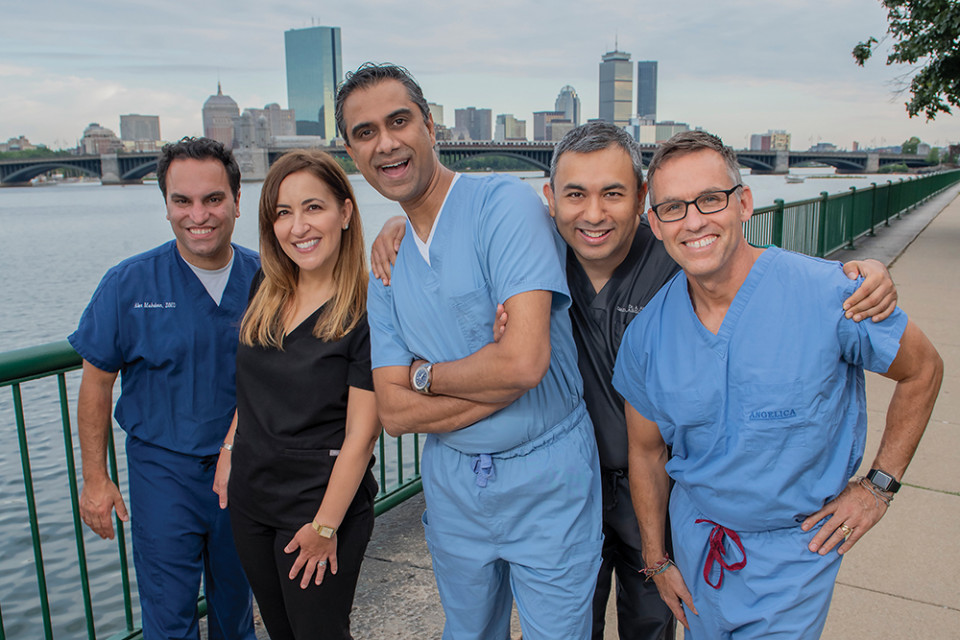
Left to right: Dr. Alexander Moheban, Dr. Jill Tanzi, Dr. Sathish Gobichettypalayam, Dr. Abe Abdul (Founder), Dr. Brian Shaughnessy
Dental Cupid, a new, free platform founded by Dr. Abe Abdul of Lux Dental, has helped thousands of patients continue to access the emergency dental care they need throughout the coronavirus pandemic. Dr. Abdul shares how, with the help of many other dentists, the platform has been such a success.
What inspired you to start Dental Cupid?
I reached out to a local hospital to ask how dentists could support healthcare workers during the pandemic, and heard that some emergency rooms have very outdated dental referral lists. With the shutdown, I had also heard from patients that they were unable to get the treatment for dental emergencies. My CTO Mingxuan Zhu and I put together a beta version of Dental Cupid in three days to help patients and referring hospitals find dentists available to provide care. We now have a cohort of dentists, including Medicaid providers, who we believe are true heroes and have lightened the load on our first responders and hospital emergency departments.
How many patients have you been able to help?
Dental Cupid has helped numerous hospitals, nonprofits, government agencies, and other dentists refer 16,000-plus patients to 12,000-plus dentists globally. The platform expanded its service to Canada and 16-plus countries in a matter of weeks. We are most heavily utilized in Massachusetts, having made thousands of connections in our home region.
Who are some of the providers that have stepped up?
We are grateful to our early adopters, such as Dr. Brian Shaughnessy of Greater Boston Smiles Pediatric Dentistry and Dr. Sathish Gobichettypalayam of Aarohi Dental. Many, including Dr. Jill Tanzi of The Dentists at Hopkinton, say they got involved to keep dental patients out of the emergency room to lighten the load on hospitals during COVID-19.
What safety protocols are put in place to keep everyone safe?
Infection control has always been on our minds. All dentists that sign up on Dental Cupid are required to sign that they have read and understood the new ADA guidelines. Many of our dentists have gone far beyond ADA recommendations. Dr. Alex Moheban of Northborough Family Dental introduced UV filters in the ductwork, Medify air purifiers throughout the building, and hypochlorous acid foggers to reduce any potentially infectious aerosols. All patients rinse with molecular iodine to eliminate COVID-19 particles from the oral cavity. Like many of our dentists, he has all patients check in over the phone for a pre-screening before their appointment.
Dana-Farber Cancer Institute
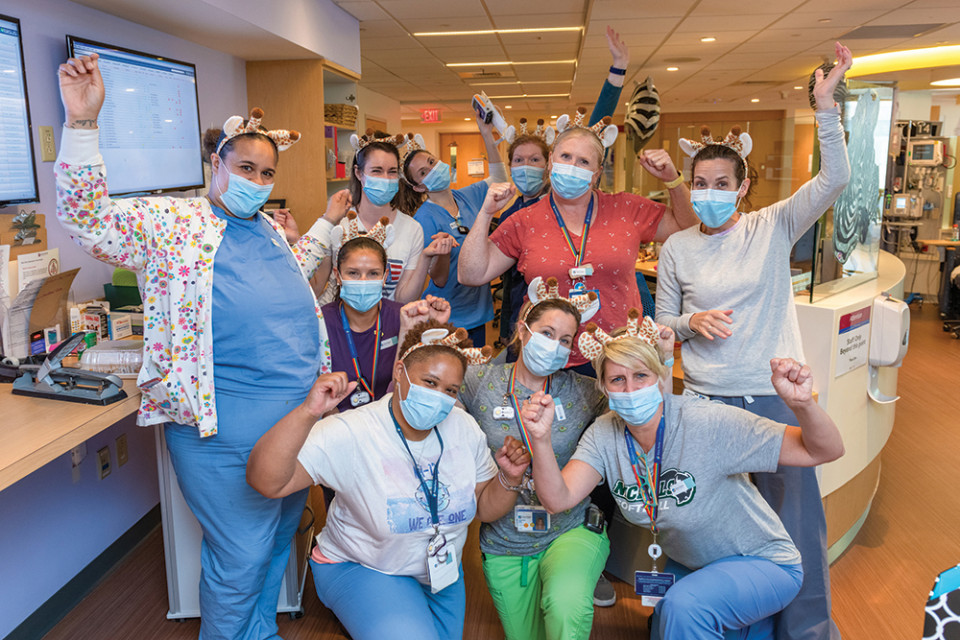
Dana-Farber Cancer Institute medical staff keep spirits high during the coronavirus pandemic. / Sam Ogden
Cancer didn’t stop when COVID-19 hit the U.S., and neither did the team at Dana-Farber Cancer Institute. Dr. Craig Bunnell, chief medical officer for Dana-Farber Cancer Institute, discusses how the Institute has kept the best treatment available for adults and children with cancer throughout the pandemic.
What was your first priority when COVID-19 came to the U.S.?
When the pandemic gripped the nation in early March, we knew that our biggest priority had to be protecting our vulnerable patients, often immunocompromised as a result of their cancer treatment, and to continue that life-saving treatment in the safest way possible. While this has always been at the heart of everything we do as an organization, the pandemic required an extraordinary response.
How have you kept patients’ spirits high while the hospital is more locked down?
We quickly embraced telehealth appointments for many follow-up visits, but one of the most difficult decisions we had to make was limiting friends and family members from physically accompanying their loved ones to their appointments. But that doesn’t mean our patients were on their own. Our volunteers who could no longer help patients face-to-face in the clinic began making appointment reminder calls to help keep the human connection alive. Valets who had previously helped visitors with parking transitioned to helping patients get to their appointments around the facility. And patients were encouraged to have their loved ones join their on-site appointments virtually, through video or phones, not only as a source of comfort and support but as an integral part of the care team.
How have your non-medical staff pitched in during this time?
In healthcare, the frontline staff are often honored as heroes in patient care. But at Dana-Farber we believe there are heroes at every turn. From the supply team who worked around the clock to secure personal protective equipment, to the operational team of more than 3,000 staff members who transitioned to remote work almost overnight, and the Information Services team that kept our computers running on-site and at home, and the researchers who continued studying ways to treat and cure cancer. We may not be on the other side of the pandemic yet, but we will get there, and when we do, we will be a stronger organization but with the same mission we’ve had for more than 70 years, to provide the best treatment available today while developing tomorrow’s cures through cutting-edge research.
Eastern Bank
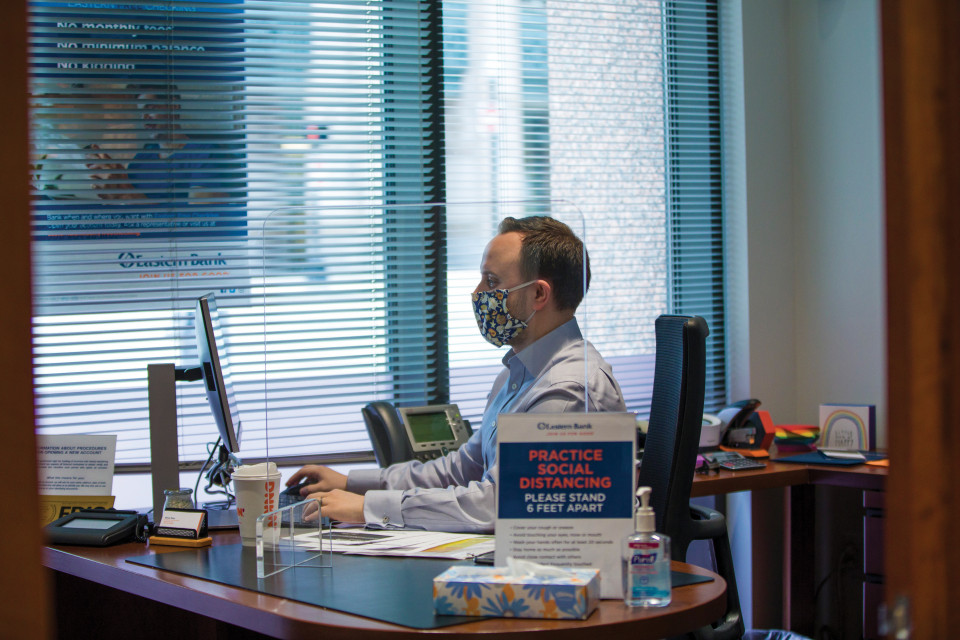
An Eastern Bank employee masks up to protect customers. / Greg M. Cooper
Eastern Bank puts the communities it serves first, whether through grants for coronavirus relief or a criminal justice reform fund. Eastern Bank EVP and Chief Marketing Officer Paul Alexander shares how the Boston-based bank has leaned into its mission of helping people prosper more than ever this year.
How did Eastern Bank aid the community throughout the economic crisis created by the pandemic?
When COVID-19 hit in March, Eastern Bank donated more than $13 million in additional grants to nonprofits throughout the communities we serve in eastern Massachusetts and southern and coastal New Hampshire and Rhode Island. This financial commitment is intended to help the community now and build the future as the economy and our neighborhoods recover. For our business customers, we rolled out loan forgiveness and originated more than $1 billion of loans to more than 8,000 borrowers under the Paycheck Protection Program (PPP), making us the number three bank provider of PPP loans in the region. To us, every PPP loan secured meant a business owner, employee, or family member providing food on the table for their family.
What was Eastern’s response to this summer’s protests around
racial inequality and the growing social justice movement?
During the initial months of the pandemic, the racial injustice and economic disparities being faced by our black and brown communities were also at a peak. Eastern Bank and our president, Quincy Miller, were founding partners of The New Commonwealth Racial Equity and Social Justice Fund. The fund is geared towards dismantling system racism, specifically policing and criminal justice reform, health care equity, youth civic engagement, and economic empowerment for black and brown communities. Eastern Bank has committed $5 million to the fund and $1 million each year to the fund over the next five years.
How did your efforts tie into your mission as a company?
As a bank, Eastern plays a critical role in providing critical access to and confidence in our banking system—especially during difficult economic times. But we aren’t just an ordinary bank. Every day, we’re lending our support toward a more just and equitable world. Using our voice and advocating for civil rights, economic justice, equity, and inclusion for everyone is rooted in our purpose—that we do good things to help people prosper. We believe that all people deserve an opportunity to prosper. And the pandemic is no exception.
Johnson & Johnson
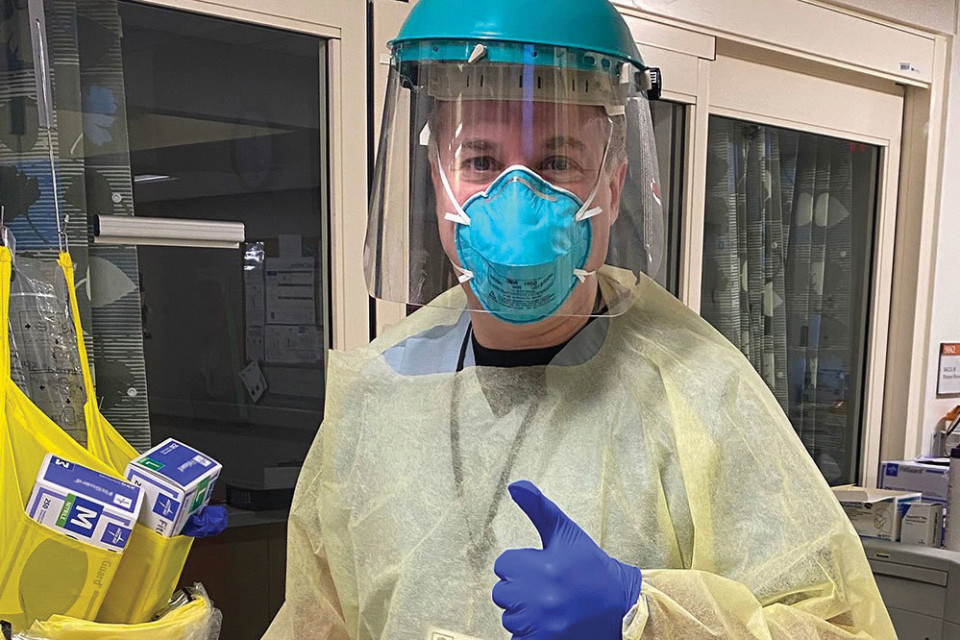
Avrum Spira, M.D., M.Sc., Global Head, Lung Cancer Initiative at Johnson & Johnson, who treated patients with COVID-19 in the Intensive Care Unit at Boston Medical Center.
In response to the COVID-19 pandemic, Johnson & Johnson is mobilizing its global reach, deep scientific expertise, extensive partnerships and financial stability to address the critical needs of families, communities, healthcare professionals and its employees around the world. On behalf of Johnson & Johnson Innovation, Stephen Pitt, Ph. D. Head of JLABS @ US North East, discusses their efforts.
Can you tell us about Johnson & Johnson’s efforts around developing a potential COVID-19 vaccine?
We’re committed to bringing an affordable COVID-19 vaccine to the public on a not-for-profit basis for emergency pandemic use, and have recently initiated our pivotal, multi-country Phase 3 trial, ENSEMBLE. We anticipate the first batches of an investigational COVID-19 vaccine could be available for potential emergency use in early 2021, if proven to be safe and effective.
How are you engaging startups to find COVID-19 solutions?
Together with our global partners, our Johnson & Johnson Innovation network has evaluated more than 100 COVID19 solutions from entrepreneurs and life-science startups, including those from the Boston ecosystem. More than 60 resident companies in our global incubator network Johnson & Johnson Innovation—JLABS are exploring novel technologies to address the COVID-19 pandemic. And, through our BLUE KNIGHT™ initiative, seven startup companies from across the global JLABS portfolio are aiming to accelerate their promising developments to fill gaps in the current set of available COVID-19 diagnostic, therapeutic, vaccine, and other potential technology solutions.
How else are you supporting our frontline heroes?
In March 2020, the Johnson & Johnson Family of Companies and the Johnson & Johnson Foundation committed $50 million dollars to support and supply frontline health workers, delivering essential training and education, supporting mental health and well-being, and fostering advocacy.
What goals have you set moving forward?
We’re aiming to achieve representation of populations that have been disproportionately impacted by the pandemic in the implementation of our COVID-19 vaccine candidate Phase 3 clinical trial program. Our Diversity in Innovation QuickFire Challenge for Black, Hispanic, and American Indian innovators is another way we’re addressing healthcare needs of underserved communities.
Koulopoulos, Vona & Co. Builders
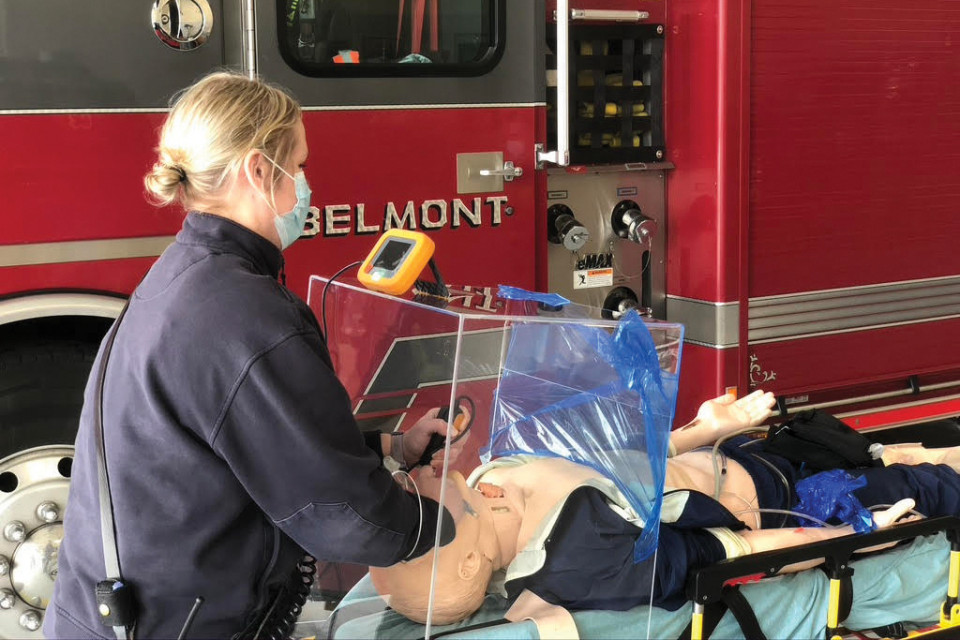
A Belmont firefighter tests one of the aerosol boxes. The boxes were created as part of the
“Maybe We Can Help” initiative. More than 700 protection devices have been donated to hospitals and fire departments from Boston to New York.
During the height of COVID-19, Koulopoulos, Vona & Co. (KVC) Builders, a New England custom-home building and renovation company, used their expertise to help frontline workers and patients. Brian Vona, managing partner at KVC Builders, discusses how the company shifted their focus so quickly.
What influenced you to utilize KVC Builder’s resources to aid health care workers and patients throughout the pandemic?
We have relatives and friends who are first responders and witnessed first hand how many in their community were getting sick during the height of the spread of COVID. We just wanted to do our best to help them. We believe the saying, “for those who have been given much, much is expected.” Spearheaded by my brother Ken, KVC and our subcontractor were joined by other members of the building community to assemble hundreds of aerosol boxes that were used to help frontline workers place patients on ventilators.
How do your efforts speak to the building and construction community at large?
Our company, along with so many other subcontractors and vendors, have always been there to help, and have really stepped up to do what they can during COVID-19. I think the building community is an amazingly strong group of goodhearted individuals with a purpose to help others. We are just a small part of a great group.
How has KVC Builders been keeping your employees and customers safe?
Our customers have been great. They stood with us while we “took a break” in April to protect our employees, stop the spread, and keep our first responders safe. We voluntarily shut our company down to make certain we weren’t adding to the spread when Massachusetts was getting hit hard by COVID-19. Now that we’re back, we’re working in shifts, have implemented more flexible hours, and have new cleaning protocols both in our offices and on our sites based on health guidelines. Our people know their health is our main priority, and our morale is boosted by being a part of the solution. We want to help Governor Baker get through this! Both him and Mayor Walsh are doing a fantastic job leading.
What changes will you keep in the future?
We have new cleaning protocols both in our offices and on our sites. We have been working with our employees to make certain the workplace is safe but also working together to have more flexible work hours—and doing lots of Zooms!
Suzanne & Company
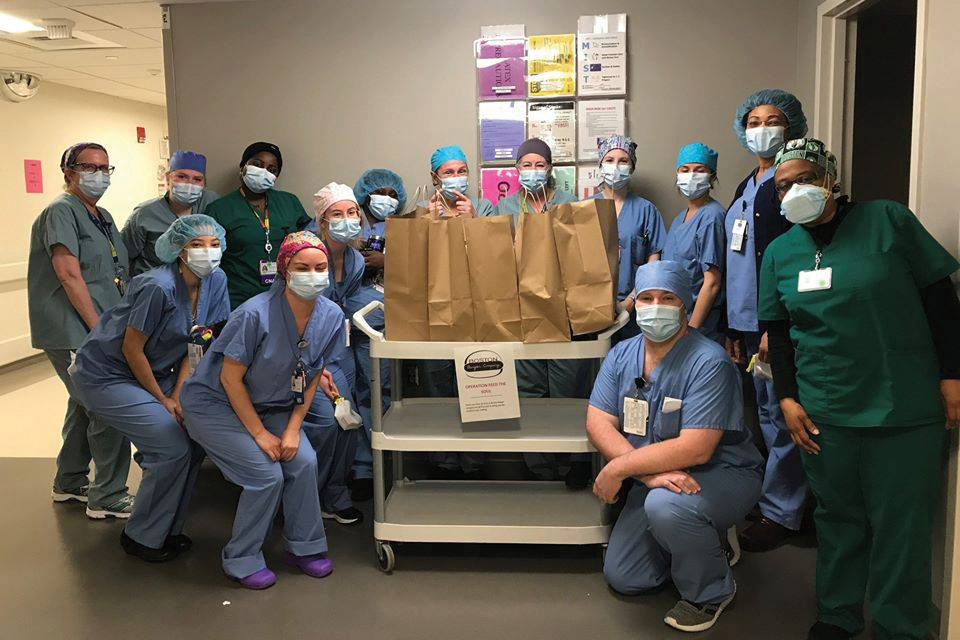
Hospital staff pose with a donation from Operation Feed the Soul.
In the early days of the pandemic, when many were focused on preparing for a quarantine, Suzanne Koller, owner of Suzanne & Company Real Estate, was instead developing a community organization to support both the local economy and healthcare workers. Here, she shares how Operation Feed the Soul came to be.
What influenced you to use Suzanne & Company’s platform to help the community during this time?
When Governor Baker announced that all non-essential businesses were to close, I felt inclined to do something! So many of our clients and friends are in healthcare, and being in a small town, our restaurants and small businesses mean everything to us! Knowing that our local restaurants were already suffering, that our frontline healthcare workers were under tremendous strain, and that many people wanted to help but were asked to stay home, I just connected the dots. Operation Feed the Soul was launched—it checked all three boxes.
How did the community get involved?
Friends and neighbors around Bedford, Westford, Burlington, and beyond came together to support the local economy and healthcare workers. We asked the community to donate money to purchase many meals, thus helping to keep local restaurants going. Then the community volunteered to drive the meals to area medical facilities so that our frontline workers received a special thank you!
How many restaurants and people were you able to help?
There were a ton of restaurants that needed support to stay open and hundreds of willing volunteers to deliver the meals. We averaged 15 drop-offs a day, supporting more than 30 restaurants with orders and delivering more than 10,000 meals to about 40 medical facilities. People would actually be disappointed if they volunteered to deliver into Boston and that slot was already taken!
What surprised you the most about the initiative’s success?
How many in the community stepped up to help! There were so many people who worked really hard to manage the logistics—from restaurant sign-ups, to medical facility coordination, to managing delivery volunteers and donation. Even greater was everything that spiraled off of Operation Feed the Soul. We had community members making snack packs for workers and dropping off cards to be delivered to patients going through treatment alone. And at a time when everyone felt they were at a standstill, it inspired more ideas, community, and happiness.
William Raveis Real Estate, Mortgage & Insurance
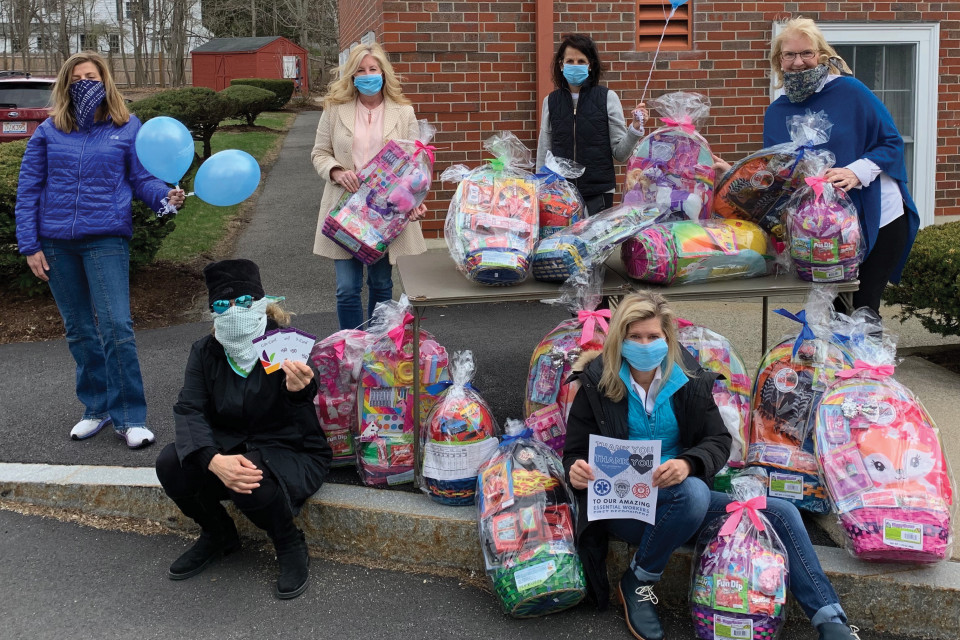
The Lexington branch office organized Easter baskets and donations for grocery store gift cards to help families in need of food during the pandemic.
William Raveis has a nine-state footprint of 137 branch offices and more than 4,200 agents. Raveis Co-President Ryan Raveis shares how the company leveraged its expansive network—from its headquarters and executive team to its Massachusetts branches and agents—to help those in need during COVID-19.
How has William Raveis jumped in to help those suffering amid the coronavirus pandemic?
Our William Raveis Charitable Fund continued its longtime support of the Damon Runyon Cancer Foundation, whose scientists are now making an impact on the coronavirus by investigating how it enters human cells, developing more efficient testing, and searching for a treatment. Also, our team at headquarters partnered with the United Way to help those left vulnerable by COVID-19. For every refinance application in the month of April, we donated $100 to provide critical services like food and shelter.
Did these efforts carry over into individual communities?
Agents and staff recognized local needs and jumped at the opportunity to support their friends and neighbors. Our Concord and Norwell offices sewed surgical masks for local hospitals. Our Lexington branch donated Easter baskets and grocery store gift cards to families in need of meals. In Marblehead, agent Jack Attridge partnered with town departments and local nonprofits to assist 650-plus elderly residents with essential needs. On the island of Nantucket, Kenny Hilbig and his team raised funds for the food bank to assist locals who could not work and needed food assistance. Out on Cape Cod, Katie Clancy helped a local oyster company pivot and sell curbside after their business came to a halt. As a family-owned business, we are amazed by our teams who found unique ways of giving back and helping neighbors.
How did your efforts align with Raveis’ founding principles?
When our dad (and CEO) Bill Raveis founded our company 46 years ago, he understood that nurturing talent and empowering agents with the best resources and services to take their business to the next level was imperative for success. That same ideology applies to our philanthropic efforts. Our teams show compassion for each other and help each other in every endeavor, and the pandemic was no different.
This post was produced and paid for by Boston Magazine


